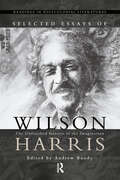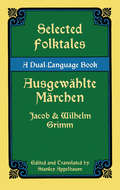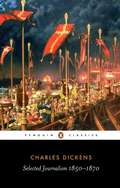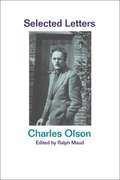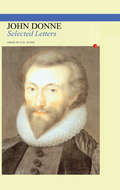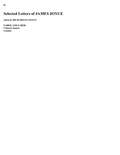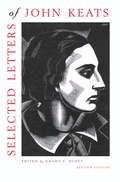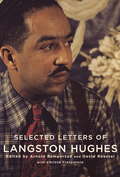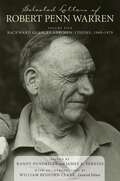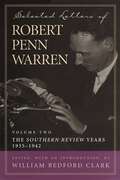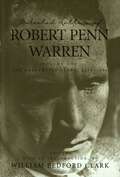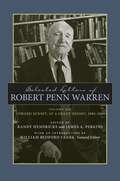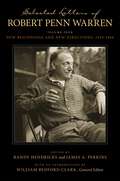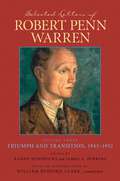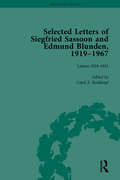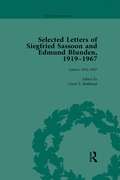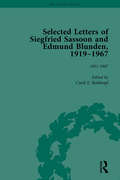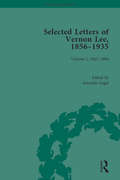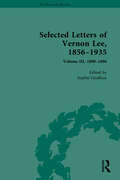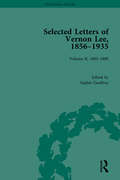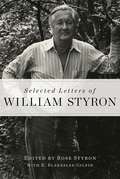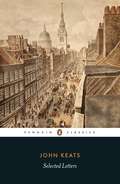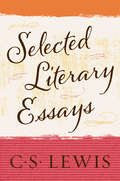- Table View
- List View
Selected Essays of Wilson Harris (Routledge Readings In Postcolonial Literatures Ser.)
by A.J.M.BundyFirst published in 1999. Routledge is an imprint of Taylor & Francis, an informa company.
Selected Folktales/Ausgewählte Märchen: A Dual-Language Book
by Jacob Grimm Wilhelm Grimm Stanley AppelbaumThe 27 world-famous tales in this collection have inspired countless adaptations in many languages. Included are such favorites as "Hänsel and Gretel," "The Brave Little Tailor," "Cinderella," and "Little Red Riding Hood," as well as the less familiar tales such as "The Danced-Out Shoes," "The Golden Bird," and "The Six Swans."
Selected Journalism 1850-1870
by Charles DickensThroughout his writing career Charles Dickens was a hugely prolific journalist. This volume of his later work is selected from pieces that he wrote after he founded the journal Household Words in 1850 up until his death in 1870. Here subjects as varied as his nocturnal walks around London slums, prisons, theatres and Inns of Court, journeys to the continent and his childhood in Kent and London are captured in remarkable pieces such as 'Night Walks', 'On Strike', 'New Year's Day' and 'Lying Awake'. Aiming to catch the imagination of a public besieged by hack journalism, these writings are an extraordinary blend of public and private, news and recollection, reality and fantastic description.
Selected Letters
by Charles OlsonIn this volume, nearly 200 letters, selected from a known 3,000, demonstrate the wide range of Olson's interests and the depth of his concern for the future which includes letters to friends and loved ones, job and grant applications, letters of recommendation, and Black Mountain College business letters, as well as correspondence illuminating Olson's poetics. The letters which span from 1931 to his death in 1970 portrays a fascinating picture of this complex poet and thinker.
Selected Letters
by Isobel Grundy Mary MontaguA revised selection of Lady Montagu's letters. Besides presenting a vivid picture of manners in a picturesque age, they contain a unique series of impressions from foreign courts seldom visited and nowhere else so intimately described. Lady Mary was the wife of a popular ambassador and, wielding the charm of a strong personality, was enabled to see and hear many things of which the ordinary traveler, or resident abroad, knew-and knows-little or nothing. Originally written, for the most part, to her sisters, her daughter, or to very intimate friends, her Letters are unusually detailed and frank. She was a keen observer, not superior to the love of gossip with a quick eye for the telling features of a story or situation, and an easy, effective style.
Selected Letters (Fyfield Books)
by John DonneWhether sharing his anxieties about his writing, consoling bereaved friends, complaining about the meanness of a patron or defending himself against malicious gossip, John Donne reveals himself in his letters with a directness that can be found nowhere else in his writings. These letters corroborate the impression created by his better-known writings that he was one of the most remarkable figures produced by the English Renaissance and that he possessed an extraordinarily subtle and creative intelligence.
Selected Letters of James Joyce
by James Joyce Richard EllmannThis selection of James Joyce's letters has been drawn from three volumes: the first, edited by Stuart Gilbert, appeared in 1957; the second and third, edited by me, in 1966. An eventual edition of all Joyce's letters, including many not previously known, is contemplated. But in the meantime ten letters not published before, and unpublished passages heretofore omitted from many others, are gathered together in this book.
Selected Letters of John Keats: Based on texts of Hyder Edward Rollins, Revised Edition
by John KeatsThe letters of John Keats are, T. S. Eliot remarked, "what letters ought to be; the fine things come in unexpectedly, neither introduced nor shown out, but between trifle and trifle." This new edition, which features four rediscovered letters, three of which are being published here for the first time, affords readers the pleasure of the poet's "trifles" as well as the surprise of his most famous ideas emerging unpredictably. Unlike other editions, this selection includes letters to Keats and among his friends, lending greater perspective to an epistolary portrait of the poet. It also offers a revealing look at his "posthumous existence," the period of Keats's illness in Italy, painstakingly recorded in a series of moving letters by Keats's deathbed companion, Joseph Severn. Other letters by Dr. James Clark, Percy Bysshe Shelley, and Richard Woodhouse--omitted from other selections of Keats's letters--offer valuable additional testimony concerning Keats the man. Edited for greater readability, with annotations reduced and punctuation and spelling judiciously modernized, this selection recreates the spontaneity with which these letters were originally written.
Selected Letters of Langston Hughes
by Langston Hughes Arnold Rampersad David Roessel Christa FratantoroThis is the first comprehensive selection from the correspondence of the iconic and beloved Langston Hughes. It offers a life in letters that showcases his many struggles as well as his memorable achievements. Arranged by decade and linked by expert commentary, the volume guides us through Hughes's journey in all its aspects: personal, political, practical, and--above all--literary. His letters range from those written to family members, notably his father (who opposed Langston's literary ambitions), and to friends, fellow artists, critics, and readers who sought him out by mail. These figures include personalities such as Carl Van Vechten, Blanche Knopf, Zora Neale Hurston, Arna Bontemps, Vachel Lindsay, Ezra Pound, Richard Wright, Kurt Weill, Carl Sandburg, Gwendolyn Brooks, James Baldwin, Martin Luther King, Jr., Alice Walker, Amiri Baraka, and Muhammad Ali. The letters tell the story of a determined poet precociously finding his mature voice; struggling to realize his literary goals in an environment generally hostile to blacks; reaching out bravely to the young and challenging them to aspire beyond the bonds of segregation; using his artistic prestige to serve the disenfranchised and the cause of social justice; irrepressibly laughing at the world despite its quirks and humiliations. Venturing bravely on what he called the "big sea" of life, Hughes made his way forward always aware that his only hope of self-fulfillment and a sense of personal integrity lay in diligently pursuing his literary vocation. Hughes's voice in these pages, enhanced by photographs and quotations from his poetry, allows us to know him intimately and gives us an unusually rich picture of this generous, visionary, gratifyingly good man who was also a genius of modern American letters.From the Hardcover edition.
Selected Letters of Robert Penn Warren: Backward Glances and New Visions, 1969-1979 (Southern Literary Studies)
by Robert Penn WarrenThe years 1969 and 1979 bookend a volatile decade in American history. As an articulate witness to the era of the Vietnam War, Watergate, Jimmy Carter, and the national "malaise," Robert Penn Warren produced a phenomenal body of work, securing his place in the canon of American poetry.Volume five of Selected Letters of Robert Penn Warren: Backward Glances and New Visions, 1969--1979 includes Warren's letters to friends, family, peers, editors, inquiring scholars, and critics -- recording the details of his personal and professional life and illustrating his pivotal role in twentieth-century American literature.In these turbulent but fruitful years, Warren produced both Audubon: A Vision (1969) and the revised version of Brother to Dragons (1979). In between lay some of Warren's most searching work as poet, novelist, literary critic, and social commentator.During this era Warren's achievements included his highly experimental and complex Or Else -- Poem/Poems (1974) and the Pulitzer Prize--winning Now and Then (1978). Before the end of the 1970s three more novels appeared concluding with his final book of fiction, A Place to Come To.This volume provides insight into Warren's inspiration during a remarkably productive era and will prove an essential resource on his life and work.
Selected Letters of Robert Penn Warren: The "Southern Review" Years, 1935-1942 (Southern Literary Studies)
by Robert Penn Warren?
Selected Letters of Robert Penn Warren: The Apprentice Years 1924-1934 (Southern Literary Studies)
by Robert Penn Warren?
Selected Letters of Robert Penn Warren: Toward Sunset, at a Great Height, 1980–1989 (Southern Literary Studies)
by Robert Penn WarrenIn the last decade of his life, Robert Penn Warren remained a vibrant force in American literature, producing new works of poetry and nonfiction while also dealing courageously with the gradual decline of his health and the diminishment of his poetic powers. Toward Sunset, at a Great Height, 1980--1989, the sixth and final volume of the author's selected letters, provides crucial documentation of this period, containing Warren's correspondence with friends, family, fellow writers, editors, critics, and the scholars studying his works.Warren published several volumes of poetry, including Being Here (1980), Rumor Verified (1981), and Chief Joseph of the Nez Perce (1983), and returned to nonfiction prose with Jefferson Davis Gets His Citizenship Back (1980) and the memoir Portrait of a Father (1988).His letters reveal that he tried to begin writing a novel but was unable to make substantial progress on it, and that from 1985 on he became increasingly dissatisfied with his new poems. Until his death at age eighty-four, however, Warren maintained an active correspondence filled with news about his writings and travels, accounts of the lives of his wife and children, and a stoic attitude about his own physical decline as well as a solicitousness regarding the health of others, such as his brother, Thomas, and sister, Mary. He communicated with rising young scholars and encouraged younger poets he admired.Toward Sunset, at a Great Height offers rich insights into the closing chapter of Robert Penn Warren's professional and personal life, making it an essential resource for understanding the full scope of the author's contribution to American letters.
Selected Letters of Robert Penn Warren: Triumph and Transition, 1943-1952 (Southern Literary Studies)
by Robert Penn Warren William Bedford ClarkVolume four of the Selected Letters of Robert Penn Warren covers a crucial time of personal and professional rejuvenation in Warren's life. During the fifteen-year period spanned by this correspondence, he completed Brother to Dragons; Segregation: The Inner Conflict in the South; and Who Speaks for the Negro? As these titles suggest, these years were marked by Warren's immersion in American history and his maturing interest in race relations. They also saw his return to lyric poetry, after a ten-year hiatus, with the publication of the Pulitzer Prize--winning collection Promises. Along with seeing the completion of some of his most successful work, this period was a time of momentous change in Warren's life, including his move to Yale University; his marriage to his second wife, Eleanor; and the birth of his two children. As a chronicle of Warren's thoughts on his family, his work, his friends, the state of literary studies, and the culture at large, these letters are invaluable.Unlike many writers, Warren rarely drafted his correspondence with future readers and scholars in mind; he typically saved his prepared statements about the human condition and the state of the world for his poetry, fiction, and social commentary. His letters offer a candid and personal glimpse of Warren's relationships as well as his personal views on literature, politics, and social trends. Their recipients include Ralph Ellison, Allen Tate, Saul Bellow, Robert Lowell, Eudora Welty, and Louis Rubin, as well as Warren's editors, reviewers, collaborators, and other friends.Providing an unusually vivid and personal account of Warren's rich and fully realized life, these missives are equally revealing of his thoughts on the state of contemporary American culture during this dynamic time in American history.
Selected Letters of Robert Penn Warren: Triumph and Transition, 1943-1952 (Southern Literary Studies)
by Robert Penn Warren?
Selected Letters of Siegfried Sassoon and Edmund Blunden, 1919�1967 Vol 1
by Carol Z RothkopfOf the 16 WWI poets memorialized in Westminster Abbey, two were destined to become lifelong friends. Although both served on the Western Front, it was not until 1919 that Siegfried Sassoon received his first letter from Edmund Blunden. This collection of Sassoon and Blunden’s correspondence contains more than 1,000 letters, cards and telegrams.
Selected Letters of Siegfried Sassoon and Edmund Blunden, 1919�1967 Vol 2 (The\pickering Masters Ser.)
by Carol Z RothkopfOf the 16 WWI poets memorialized in Westminster Abbey, two were destined to become lifelong friends. Although both served on the Western Front, it was not until 1919 that Siegfried Sassoon received his first letter from Edmund Blunden. This collection of Sassoon and Blunden’s correspondence contains more than 1,000 letters, cards and telegrams.
Selected Letters of Siegfried Sassoon and Edmund Blunden, 1919�1967 Vol 3 (The\pickering Masters Ser.)
by Carol Z RothkopfOf the 16 WWI poets memorialized in Westminster Abbey, two were destined to become lifelong friends. Although both served on the Western Front, it was not until 1919 that Siegfried Sassoon received his first letter from Edmund Blunden. This collection of Sassoon and Blunden’s correspondence contains more than 1,000 letters, cards and telegrams.
Selected Letters of Vernon Lee, 1856 - 1935: Volume I, 1865-1884 (The Pickering Masters)
by Amanda GagelVernon Lee was the pen name of Violet Paget (1856–1935) – a prolific author best known for her supernatural fiction, her support of the Aesthetic Movement and her radical polemics. She was also an active letter writer whose correspondents include many well-known figures in fin de siècle intellectual circles across Europe. However, until now no attempt has been made to make these letters widely available in their complete form. This multi-volume scholarly edition presents a comprehensive selection of her English, French, Italian, and German correspondence — compiled from more than 30 archives worldwide — that reflect her wide variety of interests and occupations as a Woman of Letters and contributor to scholarship and political activism. Letters written in a language other than English have been expertly translated by scholars Sophie Geoffroy (from the French), Crystal Hall (from the Italian), and Christa Zorn (from the German). The edition focuses on those letters concerning the writing, ideas and aesthetics that influenced Lee’s articles, books and stories. Full transcriptions of some 500 letters, covering the years 1856-1935, are arranged in chronological order along with a newly written introduction that explains their context and identifies the recipients, friends and colleagues mentioned. Since scholarship on Lee’s critical and creative output is still in the beginning stages, these letters will serve a purpose to students and researchers in a number of academic fields. In this first volume, tracing the years 1856– 1884, the assembled letters cover the beginnings of her career, encompassing her first publication, visits to London and encounters with some of the important artistic figures of the time. As her career begins to blossom, the letters also reflect the expansion of her subject matter from cultural studies and art history to novels and aesthetic philosophy. Correspondents include Lee’s parents, Matilda and Henry Paget; her brother the poet Eugene Lee-Hamilton; English poet Mary Robinson; English authors Henrietta Jenkin and Linda Villari; and Italian writers Enrico Nencioni, Mario Pratesi, and Angelo De Gubernatis, among others.
Selected Letters of Vernon Lee, 1856–1935 (The Pickering Masters #3)
by Amanda Gagel Sophie GeoffroyVernon Lee was the pen name of Violet Paget – a prolific author best known for her supernatural fiction, her support of the Aesthetic Movement and her radical polemics. She was an active correspondent who included many well-known figures among her circle. This scholarly edition of her letters makes a selection from more than 30 archives worldwide.
Selected Letters of Vernon Lee, 1856–1935: Volume II - 1885-1889 (The Pickering Masters)
by Sophie Geoffroy; Amanda Gagel; Crystal HallVernon Lee was the pen name of Violet Paget – a prolific author best known for her supernatural fiction, her support of the Aesthetic Movement and her radical polemics. She was an active correspondent who included many well-known figures among her circle. This scholarly edition of her letters makes a selection from more than 30 archives worldwide.
Selected Letters of William Styron
by William Styron Rose Styron R. Blakeslee GilpinIn 1950, at the age of twenty-four, William Clark Styron, Jr., wrote to his mentor, Professor William Blackburn of Duke University. The young writer was struggling with his first novel, Lie Down in Darkness, and he was nervous about whether his "strain and toil" would amount to anything. "When I mature and broaden," Styron told Blackburn, "I expect to use the language on as exalted and elevated a level as I can sustain. I believe that a writer should accommodate language to his own peculiar personality, and mine wants to use great words, evocative words, when the situation demands them." In February 1952, Styron was awarded the Prix de Rome of the American Academy of Arts and Letters, which crowned him a literary star. In Europe, Styron met and married Rose Burgunder, and found himself immersed in a new generation of expatriate writers. His relationships with George Plimpton and Peter Matthiessen culminated in Styron introducing the debut issue of The Paris Review. Literary critic Alfred Kazin described him as one of the postwar "super-egotists" who helped transform American letters. His controversial The Confessions of Nat Turner won the 1968 Pulitzer Prize, while Sophie's Choice was awarded the 1980 National Book Award, and Darkness Visible, Styron's groundbreaking recounting of his ordeal with depression, was not only a literary triumph, but became a landmark in the field. Part and parcel of Styron's literary ascendance were his friendships with Norman Mailer, James Baldwin, John and Jackie Kennedy, Arthur Miller, James Jones, Carlos Fuentes, Wallace Stegner, Robert Penn Warren, Philip Roth, C. Vann Woodward, and many of the other leading writers and intellectuals of the second half of the twentieth century. This incredible volume takes readers on an American journey from FDR to George W. Bush through the trenchant observations of one of the country's greatest writers. Not only will readers take pleasure in William Styron's correspondence with and commentary about the people and events that made the past century such a momentous and transformative time, they will also share the writer's private meditations on the very art of writing.Advance praise for Selected Letters of William Styron "I first encountered Bill Styron when, at twenty, I read The Confessions of Nat Turner. Hillary and I became friends with Bill and Rose early in my presidency, but I continued to read him, fascinated by the man and his work, his triumphs and troubles, the brilliant lights and dark corners of his amazing mind. These letters, carefully and lovingly selected by Rose, offer real insight into both the great writer and the good man."--President Bill Clinton"The Bill Styron revealed in these letters is altogether the Bill Styron who was a dear friend and esteemed colleague to me for close to fifty years. The humor, the generosity, the loyalty, the self-awareness, the commitment to literature, the openness, the candor about matters closest to him--all are on display in this superb selection of his correspondence. The directness in the artful sentences is such that I felt his beguiling presence all the while that I was enjoying one letter after another."--Philip Roth "Bill Styron's letters were never envisioned, far less composed, as part of the Styron oeuvre, yet that is what they turn out to be. Brilliant, passionate, eloquent, insightful, moving, dirty-minded, indignant, and hilarious, they accumulate power in the reading, becoming in themselves a work of literature."--Peter MatthiessenFrom the Hardcover edition.
Selected Letters: The Complete Poems And Selected Letters (Collins Classics Ser.)
by John Keats'I am certain of nothing but the holiness of the heart's affections, and the truth of imagination' - Keats, in a letter to his friend Benjamin Bailey in November 1817.In a period of great letter-writing, Keats's letters are outstanding. They begin in summer 1816, as he approached his twenty-first birthday, and were written over the next four years until his early death. Viewed together, they give the fullest and most poignant record we have of Keats's ambitions and hopes as a poet, his life as a literary man about town, his close relationship with his brothers and young sister, and, later, his passionate, jealous and frustrated love for Fanny Brawne.Keats enclosed many of his poems with his letters, and read together, they offer an incomparable insight into his creative process and development as a poet. This major new edition edited by Professor John Barnard includes an introduction and notes, as well as a map of Keats's Scottish walking tour and reproductions of his letters.John Keats was born in October 1795. His Poems appeared in 1817, while Endymion was published in 1818, both to mixed reviews. In 1819 he wrote The Eve of St Agnes, La Belle Dame sans Merci, the major odes, Lamia and the Fall of Hyperion. Keats was already unwell when preparing his 1820 volume for the press; by the time it appeared in July he was desperately ill. He died in Rome in 1821, in a rented apartment next to the Spanish Steps, at the age of twenty-five.John Barnard is Emeritus Professor of English Literature at the University of Leeds and has edited The Complete Poems of Keats for Penguin Classics.
Selected Literary Essays
by C. S. LewisSelected Literary Essays includes over twenty of C. S. Lewis's most important literary essays, written between 1932 and 1962. The topics discussed in this volume range from Chaucer to Kipling, from "The literary impact of the authorized version" to "Psycho-analysis and literary criticism," to Shakespeare and Bunyan, and Sir Walter Scott and William Morris. Common to each essay, however, are the lively wit, the distinctive forthrightness, and the discreet erudition which characterize Lewis's best critical writing.
Selected Literary Essays
by C. S. LewisSelected Literary Essays includes over twenty of C. S. Lewis's most important literary essays, written between 1932 and 1962. The topics discussed in this volume range from Chaucer to Kipling, from "The literary impact of the authorized version" to "Psycho-analysis and literary criticism," to Shakespeare and Bunyan, and Sir Walter Scott and William Morris. Common to each essay, however, are the lively wit, the distinctive forthrightness, and the discreet erudition which characterize Lewis's best critical writing.
